19 January 2023: China’s Development Projects in the Global South:Economic and political consequences
Prof. Dr. Andreas Fuchs, University of Göttingen & Kiel Institute of Economics
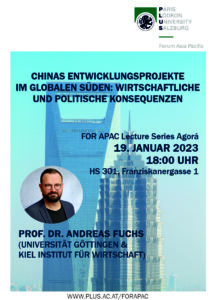 – China’s development projects around the world are rapidly gaining importance. Many observers see this development as a threat to international development finance, which has so far been dominated by the US, Europe and Japan. Others praise Beijing for the great development opportunities that have emerged. This talk will provide an overview of recent research on China’s international development projects, as summarised in the book Banking on Beijing, published by Cambridge University Press in May 2022. We will explore the following questions: What determines the scale of Chinese development assistance and other government infrastructure projects? In which countries, provinces and sectors is China particularly active and why? What impact do Beijing’s development activities have on growth, good governance, conflict and other development indicators in recipient countries? What geopolitical challenges does this pose for Europe?
– China’s development projects around the world are rapidly gaining importance. Many observers see this development as a threat to international development finance, which has so far been dominated by the US, Europe and Japan. Others praise Beijing for the great development opportunities that have emerged. This talk will provide an overview of recent research on China’s international development projects, as summarised in the book Banking on Beijing, published by Cambridge University Press in May 2022. We will explore the following questions: What determines the scale of Chinese development assistance and other government infrastructure projects? In which countries, provinces and sectors is China particularly active and why? What impact do Beijing’s development activities have on growth, good governance, conflict and other development indicators in recipient countries? What geopolitical challenges does this pose for Europe?
15 November 2022: China’s Environmental Authoritarianism as a Global Model? Opportunities and Challenges
Dr. Maria Bondes, Friedrich-Alexander University Erlangen-Nürnberg 
– In view of the global environmental crisis and the failure of leading democratic states to effectively address the climate problem, there is much debate about whether authoritarian governance models – so-called “environmental authoritarianism” – might be more suitable to tackle the ecological crisis of our time in time. As part of its new assertive foreign policy, China’s government under Xi Jinping is promoting China’s top-down environmental governance system and its vision of an “ecological civilisation” as a global model for a more sustainable future for our planet. The country presents itself on the international stage as a pioneer of global environmental and climate governance. At the same time, China is struggling domestically with a massive environmental crisis that threatens the legitimacy of the ruling Chinese Communist Party (CCP) and is seen by some observers as the “Achilles’ heel of modern China”. Here, the Chinese leadership points to great successes in the fight against air pollution, progress in national climate and energy policy and China’s world-leading role in renewable energy. The lecture takes a critical look at China’s international ambitions and national successes in the environmental field and highlights the strengths and weaknesses of China’s top-down environmental governance system. On this basis, it will discuss to what extent China’s “environmental authoritarianism” could be a global model to address the ecological crisis of our time.
16 November 2022: Constructing ‘self’ and ‘other’ in the micropolitics of housework: Sri Lankan migrant domestic workers in Saudi Arabia
(Lecture in collaboration with the Department of Sociology and Human Geography) 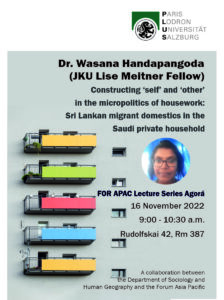 Dr. Wasana Handapangoda, Johannes Kepler University (JKU) Linz
Dr. Wasana Handapangoda, Johannes Kepler University (JKU) Linz
– In a workplace simultaneously characterised by a high degree of ‘personalism and asymmetry’ (in Evelyn Nakano Glenn’s terms, 1984), live-in migrant domestic work provides an ideal instance of private home as a site of political struggle embedded in the dynamics of contemporary global capitalism. Combining structural analysis of domestic labour, neoliberal globalisation and boundary-work as theoretical frameworks, this lecture gives insights into the making of ‘self’ and ‘other’ in the micropolitics of employing Sri Lankan migrant domestic workers in Saudi households. The lecture is based on some of the findings of my fieldwork in Saudi Arabia carried out in 2020. Both the employers and workers used everyday rituals, rules and behaviour regulations of paid domestic labour to distinguish between ‘self’ and ‘other’ categories and construct spatial territories in the not so private world of the Saudi private household. This included the everyday politics of space, mobility and communication, food, clothing/dress, gifting and religious beliefs, over which the boundaries ‒ physical, social bodily, symbolic ‒ were constructed, contested and negotiated. The boundaries were policed and protected, nevertheless they were movable and crossable. In doing micropolitics of housework, both the employers and workers simultaneously intensified and downplayed the structural divides that separated and connected them in the complex organisation of domestic work.
15 March 2023: „UNLOCKING POTENTIAL: A COMPARISON OF LABOUR MARKET INTEGRATION OF SKILLED MIGRANTS IN SOUTH KOREA AND JAPAN“
(Lecture in collaboration with the Department of Sociology and Human Geography)
Dr. Aimi MURANAKA (Institute of East Asian Studies, University of Duisburg-Essen) and Dr. Joohyun Justine PARK (Goethe University of Frankfurt)
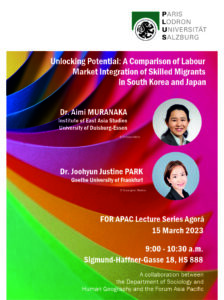
– How to attract and retain foreign skilled professionals is a crucial question for governments and businesses around the world. However, the literature on the international migration still largely focuses on “Western” traditional immigration countries, – the U.S., Canada, the UK and Australia-, while studies on skilled migration in Asia are limited. This on-going comparative study centres on “emerging migration countries” in East Asian economies, namely South Korea and Japan. Based on a comparison of skilled visa policies and interview data, this study explores the challenges faced by foreign skilled professionals in their pursuit of labour market integration in these countries. Both countries are facing accelerated labour shortages due to their low fertility rate and aging populations, leading both governments to actively seek foreign talents. Nevertheless, despite strong efforts from the governments, the findings of this comparative study suggest that skilled migrants experience legal and structural barriers to enter the labour market and to purse upward career mobility. Even if they secure a job post, they are under precarious employment conditions and/or they cannot necessarily make use of their “skills”. The findings from the two research projects hint similar but slightly different labour market integration outcomes of foreign professionals in two countries. Despite the efforts made by both governments, the comparative study suggests that there is still a significant gap in successfully retaining these skilled migrants.
5 May 2023: „The Chinese Archaeology-‘Oscar’: The ‘Ten Great Annual Discoveries’ between Science and Politics“
Prof. Dr. Maria KHAYUTINA (Institute of Sinology, University of Munich)
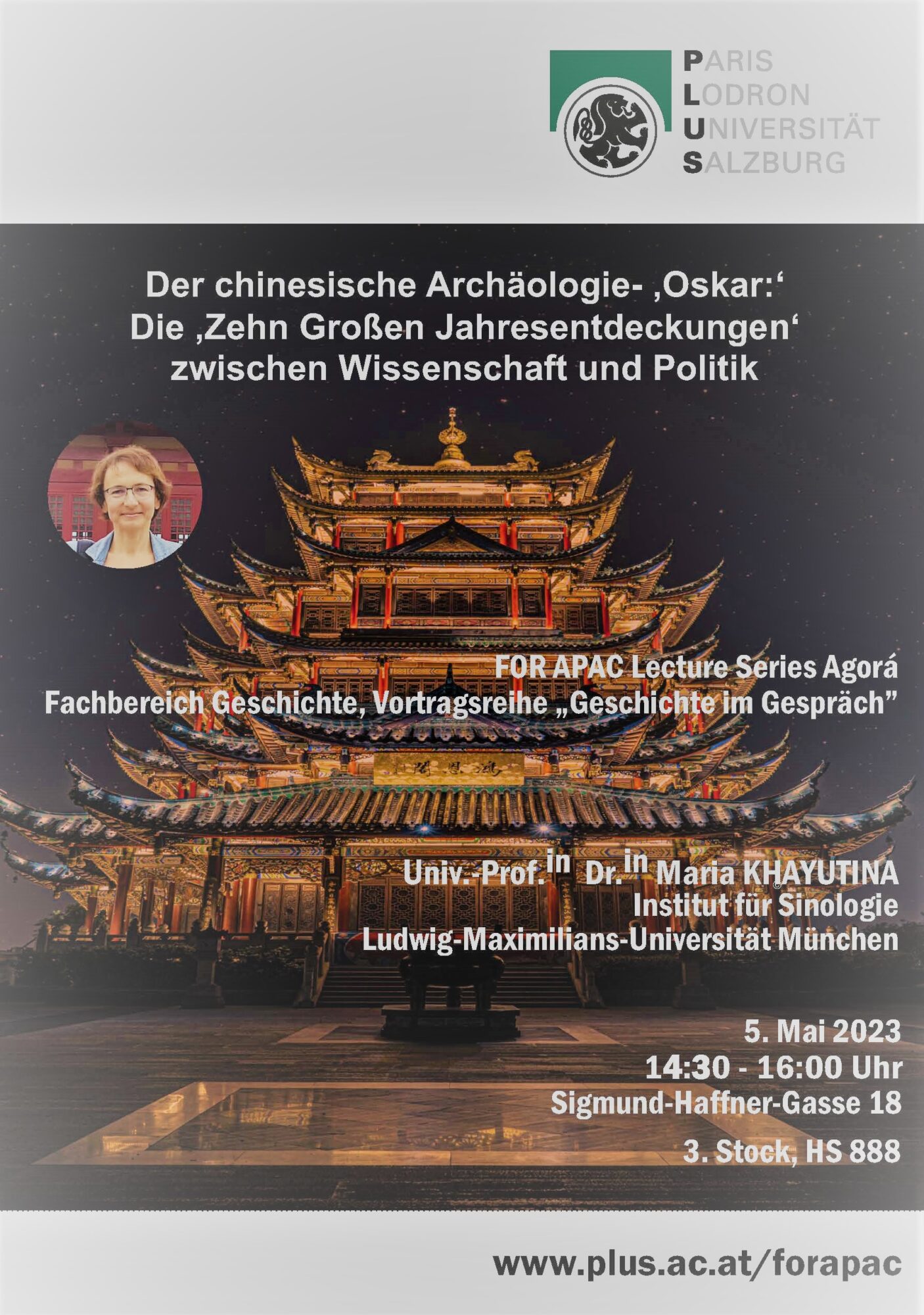 – For a hundred years, modern archaeology has served as an important binding agent for the Chinese national historical narrative. Research results have traditionally been communicated to the population in edited form through textbooks, museums and, where appropriate, newspapers. Since the beginning of the 21st century, the state has been trying to keep public interest in archaeology alive with the help of new ways of presenting the material. The annual awards ceremony for the ten most important archaeological excavations of the previous year causes quite a stir. Although these are often spectacular finds, only a few of them – such as the sacrificial pits with bronze figures and gold masks in Sanxingdui in 2021 – are noticed in the West. This lecture provides information on the political background, scientific significance, public resonance as well as economic impact of the Chinese archaeology “Oscar” and introduces three outstanding award winners from the last five years.
– For a hundred years, modern archaeology has served as an important binding agent for the Chinese national historical narrative. Research results have traditionally been communicated to the population in edited form through textbooks, museums and, where appropriate, newspapers. Since the beginning of the 21st century, the state has been trying to keep public interest in archaeology alive with the help of new ways of presenting the material. The annual awards ceremony for the ten most important archaeological excavations of the previous year causes quite a stir. Although these are often spectacular finds, only a few of them – such as the sacrificial pits with bronze figures and gold masks in Sanxingdui in 2021 – are noticed in the West. This lecture provides information on the political background, scientific significance, public resonance as well as economic impact of the Chinese archaeology “Oscar” and introduces three outstanding award winners from the last five years.
22 June 2023: „THAILAND AS A SECOND HOME FOR RETIREES“ Documentary Screening and Discussion“
Prof. Dr. Sirijit SUNANTA (Research Institute for Languages and Cultures of Asia Mahidol University, Thailand)
 This documentary is an episode in the documentary series „Some One“ that explores contemporary diversity in Thai society. Thailand has been a destination for international retirement migration. The Thai government promotes long-stay tourism and the transnational retirement industry as a strategy for economic development. Foreign retirees constitute a new group of population in Thailand, a middle-income country that is facing rapid population ageing. Link to the documentary https://www.youtube.com/watch?v=1SrRLwrQq0c&t=47s
This documentary is an episode in the documentary series „Some One“ that explores contemporary diversity in Thai society. Thailand has been a destination for international retirement migration. The Thai government promotes long-stay tourism and the transnational retirement industry as a strategy for economic development. Foreign retirees constitute a new group of population in Thailand, a middle-income country that is facing rapid population ageing. Link to the documentary https://www.youtube.com/watch?v=1SrRLwrQq0c&t=47s
Sirijit Sunanta is associate professor in the PhD Program in Multicultural Studies, Research Institute for Languages and Cultures of Asia, Mahidol University, Thailand. Her research interests include gender and migration, globalization and food cultures, and the politics of diversity in Thailand. The geographical focus of her research is transnational mobilities between Europe and Thailand. She has published widely in leading journals in the areas of Asian Studies, Migration Studies, Gender Studies and Tourism Studies. Sirijit’s current research projects focus on care transnationalization, old age care and migration, and gendered labour in the Thai tourism industry.
23 June 2023: „Collaborative German-Austr(al)ian Materials Science on Extracellular Matrices of Plants“
Dr. Michaela EDER (Max Planck Institute of Colloids and InterfacesPotsdam, Germany)
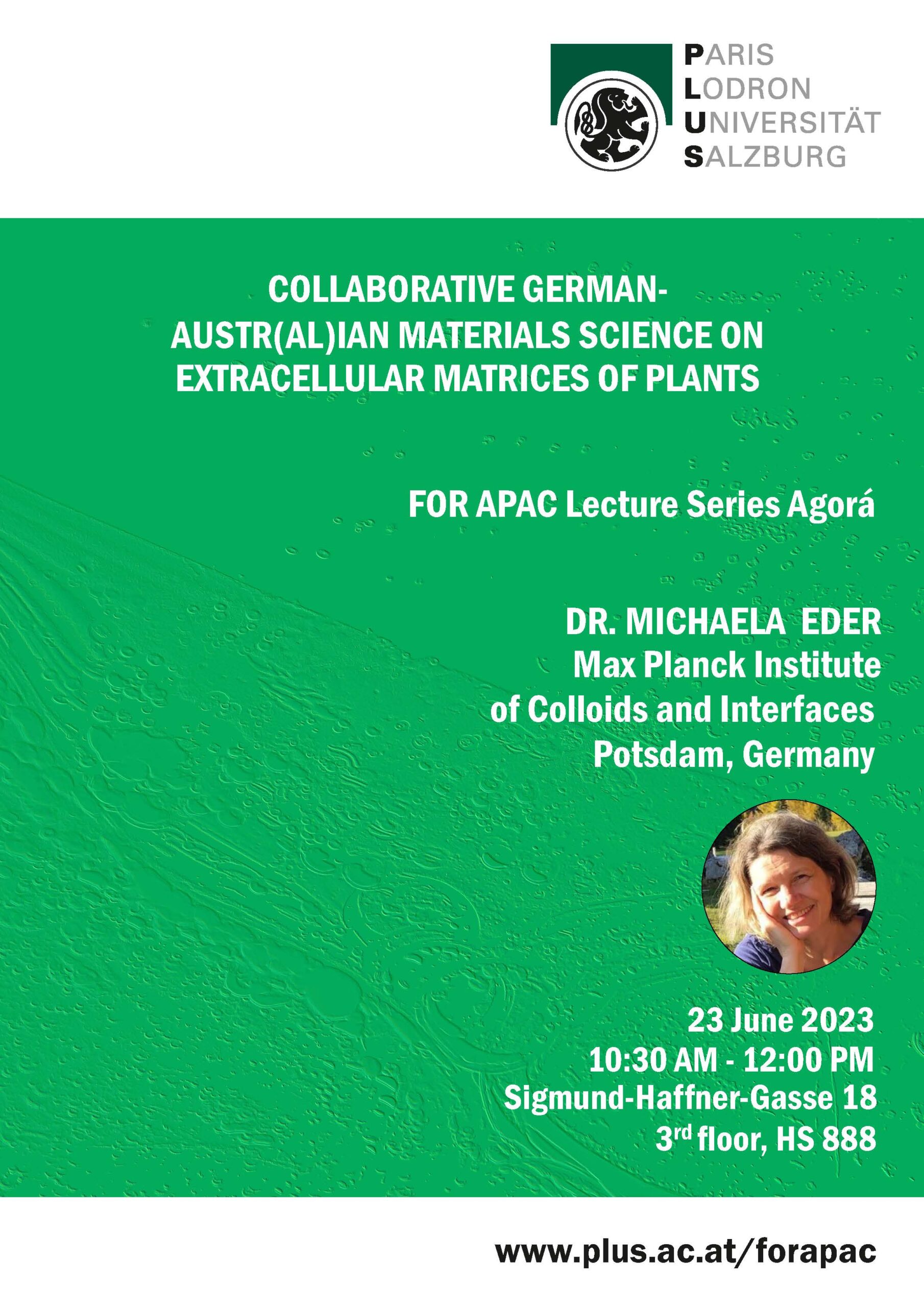 Australia is blessed by an extremely old ecosystem and a large biodiversity, especially in areas with extreme conditions caused by regularly occurring fires. To adjust to such environmental conditions plants have evolved various strategies. A particularly spectactular example is the seed storage and protection mechanism of the iconic Australian plant genus Banksia. Banksias can keep their seed on the plant for many years, building up a canopy stored seed bank. The delicate embryos are well protected in seed pods, consisting of dead yet functional tissues. Foci of our research were the protection of the seeds during storage and fire exposure of the cones and their 2-step opening mechanism, which depends on a climatic gradient and requires location-dependent temperatures between 55 – 72°C for initial opening and subsequent exposure to water for seed release. On the example of our research on these fascinating structures I will also talk about our collaboration with Austria and Australia and about the Max Planck Queensland Center for the Materials Science of Extracellular Matrices which started in April 2022 and its impacts on our research.
Australia is blessed by an extremely old ecosystem and a large biodiversity, especially in areas with extreme conditions caused by regularly occurring fires. To adjust to such environmental conditions plants have evolved various strategies. A particularly spectactular example is the seed storage and protection mechanism of the iconic Australian plant genus Banksia. Banksias can keep their seed on the plant for many years, building up a canopy stored seed bank. The delicate embryos are well protected in seed pods, consisting of dead yet functional tissues. Foci of our research were the protection of the seeds during storage and fire exposure of the cones and their 2-step opening mechanism, which depends on a climatic gradient and requires location-dependent temperatures between 55 – 72°C for initial opening and subsequent exposure to water for seed release. On the example of our research on these fascinating structures I will also talk about our collaboration with Austria and Australia and about the Max Planck Queensland Center for the Materials Science of Extracellular Matrices which started in April 2022 and its impacts on our research.
Academic career
- from 09/2011: Research group leader at the Max-Planck-Institute of Colloids and Interfaces, Department of Biomaterials, Potsdam, Germany
- 10/2007 – 09/2011: Post-doc at the Max-Planck-Institute of Colloids and Interfaces, Department of Biomaterials, Potsdam, Germany
- 09/2004 – 09/2007: PhD student at the Max-Planck-Institute of Colloids and Interfaces, Department of Biomaterials, Potsdam, Germany
- 07/2003 – 08/2004: research assistant at the Institute of Meteorology and Physics (since 01/2004 Department of Material Sciences and Process Engineering)
- 03/2003 – 06/2003: research fellowship at the Institute of Meteorology and Physics
- from 2002 – 2003 tutor at the Institute of Meteorology and Physics
Other
- since 01/2019 involved in the Excellence Cluster „Matters of Activity“
- 01/2015 – 12/2018 Associated Member in the Excellence Cluster „Image-Knowledge-Gestaltung“
11/2008 – 10/2012: leader of working group 2 “(Hygro)-mechanical behaviour of wood”, COST Action FP0802 – Experimental and Computational Micro-Characterization Techniques in Wood Mechanics
3 November 2023: „Mapping Peking 1688 – 1914: a Czech Jesuit and a Russian Priest, Chinese Painters and German Soldiers, the Interweaving of City Plans“
Prof. ZHENG Cheng (Chinese Academy of Social Science)
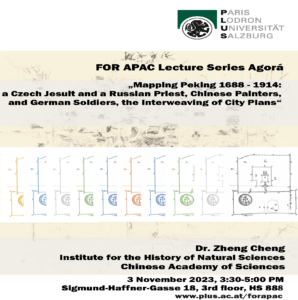 Before the detailed surveyed map finally established a „standard“ representation of old Peking in the beginning of the 20th century, various city plans of Peking had been produced and published in European languages since the late 17th century. Intelligence gathering, commercial competition, academic pursuit or sheer curiosity drove missionaries, envoys, soldiers, and merchants engaged in making new maps. The development of European plans and Chinese maps were interwoven and closely related to the modernization process of China. Therefore, the evolution of plans of Peking is not only a history of competition in intellectual and military domains, but also a history of cultural exchange. It serves a case study in the broader context of global history.
Before the detailed surveyed map finally established a „standard“ representation of old Peking in the beginning of the 20th century, various city plans of Peking had been produced and published in European languages since the late 17th century. Intelligence gathering, commercial competition, academic pursuit or sheer curiosity drove missionaries, envoys, soldiers, and merchants engaged in making new maps. The development of European plans and Chinese maps were interwoven and closely related to the modernization process of China. Therefore, the evolution of plans of Peking is not only a history of competition in intellectual and military domains, but also a history of cultural exchange. It serves a case study in the broader context of global history.
ZHENG Cheng 郑诚 received his doctoral degree and became a researcher of the Institute for the History of Natural Sciences, Chinese Academy of Sciences in 2012. His main research field is the history of science and technology in Ming-Qing period. His publications include Gunpowder Weaponry and Warfare in Ming-Qing China (2022), An Illustrated History of Gunpowder Weapons in China (2020), critical editions of a selection of Chinese treatises on European military technology during the Ming-Qing transition (2019), and Ryu Seong-ryong’s memoir of Imjin war Jingbirok (2019). For more information on Prof. Zheng please click here.
24 November 2023: “‘妈妈, I Miss You’: Emotional Multilingual Practices in Transnational Families”
Prof. Dr. Xiao Lan CURDT-CHRISTIANSEN (University of Bath, UK)
24 November 2023, 10:30am – 12:00pm, Sigmund-Haffner-Gasse 18, 3rd floor, HS 888Online Participation: LINK
 This study is situated in the context of the UK, in which transnational families often engage in multilingual practices with their family members near and far via digital devices or face-to-face interactions. Involving six families from two transnational communities, the Chinese and the Polish, the study focuses on emotionally related language practices. Data sources include recordings of mealtime conversations, daily WhatsApp/WeChat texts, and digital mediated family talk. Using affective repertoire as analytical framework, the study investigates linguistic features and situated language use of home language(s) in emotional negotiations between family members. In addition, it explores how multimodalities and languages are mixed to contribute to the interactional dynamics underlying ‘family talk’ and how children and adults position themselves emotionally in moment-by-moment discourse of family life.
This study is situated in the context of the UK, in which transnational families often engage in multilingual practices with their family members near and far via digital devices or face-to-face interactions. Involving six families from two transnational communities, the Chinese and the Polish, the study focuses on emotionally related language practices. Data sources include recordings of mealtime conversations, daily WhatsApp/WeChat texts, and digital mediated family talk. Using affective repertoire as analytical framework, the study investigates linguistic features and situated language use of home language(s) in emotional negotiations between family members. In addition, it explores how multimodalities and languages are mixed to contribute to the interactional dynamics underlying ‘family talk’ and how children and adults position themselves emotionally in moment-by-moment discourse of family life.
Findings include five linguistic and non-linguistic features in emotional expression: emojis, term of endearment, diminutive, direct declaration of love, and situated emotive language use. The findings contribute to FLP literature by looking into how emotions are involved in the practices of family life and the construction of familyness. Emotions, as a key factor in FLP, are directly related to parents’ perceptions of and investment in their heritage language. Although these perceptions are linked to the powerful societal languages that often represent educational possibilities, when it comes to emotional expressions, the primacy is given to the first language/heritage language.
Xiao Lan Curdt-Christiansen is Professor in Applied Linguistics at the Department of Education, University of Bath, UK. She is Director of the Centre for Research in Education in Asia and Cluster Leader in Language, Education and Practice. Her research interests encompass ideological, sociocultural-cognitive and policy perspectives on children’s multilingual education and biliteracy development. As an active researcher, she has examined bi/multilingual community-home-school contexts in the UK, Canada, France, China and Singapore on topics of curriculum policy, language-in-educational policy and family language policy. Her most recent research project is entitled Family Language Policy: A Multi-Level Investigation of Multilingual Practices in Transnational Families, funded by The Economic and Social Research Council (ESRC). She has published widely in the field of applied linguistics. Her publications have appeared in leading academic journals, such as Language Policy; International Journal of Bilingualism and Bilingual Education; Journal of Multilingual and Multicultural Development; Language and Education; and Language, Culture and Curriculum, etc.
15 December 2023: “Establishing Transdisciplinary Research and Teaching in Asian Studies: the Foundational Role of Languages and Linguistics”
Prof. Dr. Lorna CARSON (Trinity College Dublin, Ireland)
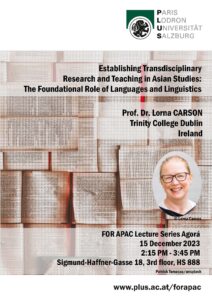 This talk argues for the foundational role of languages and linguistics in the establishment of transdisciplinary research and teaching in Asian Studies. Drawing on our experience at Trinity College Dublin and the launch of the Trinity Centre for Asian Studies in Ireland just under a decade ago, I will reflect on key elements that shaped our university’s decision-making process, including our partnerships and our disciplinary expertise. I will examine how the model we followed placed the study of language & culture and theoretical & applied linguistics at the centre of our activities. I will share some key research axes which underpin our centre’s teaching and public outreach activities, examining in particular some of the interesting (and, perhaps, surprising!) applications of primary research in languages and linguistics. Finally, I will reflect on some of the challenges we have faced in our efforts to maintain a focus on languages and linguistics in our Chinese, Korean and Japanese programmes as well as in our future plans.
This talk argues for the foundational role of languages and linguistics in the establishment of transdisciplinary research and teaching in Asian Studies. Drawing on our experience at Trinity College Dublin and the launch of the Trinity Centre for Asian Studies in Ireland just under a decade ago, I will reflect on key elements that shaped our university’s decision-making process, including our partnerships and our disciplinary expertise. I will examine how the model we followed placed the study of language & culture and theoretical & applied linguistics at the centre of our activities. I will share some key research axes which underpin our centre’s teaching and public outreach activities, examining in particular some of the interesting (and, perhaps, surprising!) applications of primary research in languages and linguistics. Finally, I will reflect on some of the challenges we have faced in our efforts to maintain a focus on languages and linguistics in our Chinese, Korean and Japanese programmes as well as in our future plans.
Lorna Carson is Head of the School of Linguistic, Speech and Communication Sciences and Professor in Applied Linguistics. She holds a B.A. (Mod.), M.Phil. in Applied Linguistics and Ph.D. from Trinity College Dublin, and an M.A. in European Studies (Human Resource Management) from the College of Europe, Bruges, Belgium. In 2015 she was elected a Fellow of Trinity College Dublin. She was the Founding Director of the Trinity Centre for Asian Studies, a multidisciplinary teaching and research centre which brings together the university’s expertise in Japanese, Korean and Chinese Studies. She was elected to the University Council in 2021. Professor Carson’s research on language learning addresses issues located at the interface between individual and societal multilingualism, with a particular attention on the language classroom, with a focus on language learning, language education policy and assessment. Her books include „Language and Identity in Europe: The Multilingual City and its Citizens“ (2020, Peter Lang), „The Multilingual City: Vitality, Conflict and Change“, co-edited with Lid King (2016, Multilingual Matters); „Language Learner Autonomy: Policy, Curriculum, Classroom“, co-edited with Breffni O’Rourke (2010, Peter Lang), and „Multilingualism in Europe: A Case Study“ (2003, 2005, Peter Lang). She is a former President of IRAAL, the Irish Association for Applied Linguistics (2014-2017). She is a member of the Governing Body of Marino Institute of Education, and sits on its Academic Council.
19 January 2024: “Civilized Cities or Social Credit? Overlap & Tension Between Governance Infrastructures in China”
Dr. Alexander TRAUTH-GOIK (University of Vienna)
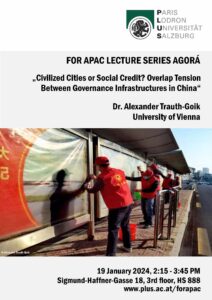 Foreign imaginaries of surveillance and informatization in China are commonly connected to notions of omnipresence, advanced technology, and coherent governance. In reality, the Chinese government’s efforts at building a digital society are permeated by confusion over the meaning of central edicts, interdepartmental and regional fragmentation, and overlap between different governance systems. This presentation interrogates the connection between two emerging governance infrastructures embedded in the Chinese Party-state’s latest informatization drive, the “National Civilized Cities Award” (NCCA) and the “Social Credit System Project” (SCSP) through a mixed methods approach. It combines data from an analysis of a recent NCCA assessment system government work manual, project websites, and findings from thirty qualitative video interviews with residents from twenty different cities in China to demonstrate that overlap between these projects is clear in terms of 1) criteria and indices measuring project development; 2) promoted virtues and individual behaviors; and 3) data sharing between systems. Local governments charged with the design and implementation of these initiatives conflate their targets and objectives, prompting occasional reprimand from higher-level authorities. Public confusion about the meaning and purpose of both the NCCA and SCSP has meanwhile accompanied haphazard system development, demonstrating that the path towards a “digital society” in China is fraught and far from uncontested.
Foreign imaginaries of surveillance and informatization in China are commonly connected to notions of omnipresence, advanced technology, and coherent governance. In reality, the Chinese government’s efforts at building a digital society are permeated by confusion over the meaning of central edicts, interdepartmental and regional fragmentation, and overlap between different governance systems. This presentation interrogates the connection between two emerging governance infrastructures embedded in the Chinese Party-state’s latest informatization drive, the “National Civilized Cities Award” (NCCA) and the “Social Credit System Project” (SCSP) through a mixed methods approach. It combines data from an analysis of a recent NCCA assessment system government work manual, project websites, and findings from thirty qualitative video interviews with residents from twenty different cities in China to demonstrate that overlap between these projects is clear in terms of 1) criteria and indices measuring project development; 2) promoted virtues and individual behaviors; and 3) data sharing between systems. Local governments charged with the design and implementation of these initiatives conflate their targets and objectives, prompting occasional reprimand from higher-level authorities. Public confusion about the meaning and purpose of both the NCCA and SCSP has meanwhile accompanied haphazard system development, demonstrating that the path towards a “digital society” in China is fraught and far from uncontested.
5 April 2024: “Imaginary Cosmography Revival in Late Joseon Korea: Circular World Maps and Their Early Chinese Sources”
Dr. Vera Dorofeeva-Lichtmann (EHESS, Paris – MPIWG, Berlin)
The “Maps of the Under-Heavens” (天下圖 Korean Cheonhado, Chinese Tianxiatu 天下) shaped as a nest of concentric zones inscribed into a circle are a cartographical puzzle in many ways. These maps serve as key maps in popular atlases which became outstandingly widespread in late Joseon Korea (18th-19th centuries). The circular world maps are the first and the only extant cartographic representations of the famous early Chinese description of the entire inhabited world, which is translated as the “Classic or Itineraries of Mountains and Seas” (Shanhaijing 山海經, compiled about the 1st century BC). Considerable time gaps between a source geographical text and the attempts to represent information derived from it as maps are rather common in the history of cartography. Ptolemaeic maps, as well as mediaeval mappaemundi provide good illustrations of this phenomenon. The Korean circular world maps are typologically similar to the mediaeval mappaemundi, and this is how the former are referred to in their first studies in order to facilitate comprehension of their nature for Western scholars (Rosetti 1905, Nakamura 1947). Both are schematic representations of the world aimed to convey a certain conceptual organisation of space, without much concern for accuracy. There is, however, one substantial difference: one can hardly imagine a wide circulation of mediaeval mappaemundi-type of maps in late modern Europe, when mathematical cartography became completely dominant. In contrast, the confusingly archaic and simplistic maps of the popular Korean atlases, including the circular world maps, continued to be produced and reproduced in an almost unchanged form, not matching the mainstream of modern cartography and insensible to its development, what apparently was one of the reasons of their popularity.
A revival of interest in imaginary cosmography occurred about a century earlier in China where appeared ‘cosmograph’-tailoured maps, which convey the symbolism of the square earth inscribed into the round heavens. These maps usually entitled “Maps of Established Positions of Heavens and Earth” (Tian Di ding wei zhi tu 天地定位之圖) are found in Chinese compendiums on divination dating from the early 17th century onwards. I shall try to demonstrate that the Korean circular maps have a close affinity with these ‘cosmograph’ maps, which, in their turn have structural parallels with the early Chinese divination boards – ‘cosmographs’ (shipan 式盤) and especially the diviner’s bronze mirrors. This allows one to see the shape of the circular world maps in a new light – not as an attempt to match it to the image of the round earth, diffused together with the Western cartography, as it is often explained, but as a symbolic representation of the heavenly circle, encompassing the terrestrial surface. The title of the maps can then be seen as referring to this cosmological idea. It should be noted that the Korean cartographical tradition favoured circular configurations.
For more information on Prof. Dorofeeva-Lichtmann, please click here and here.
26 April 2024: „THE TIANXIA VIEWPOINT IN THE TRADITIONAL CHINESE CULTURE AND THE CONTEMPORARY CONSTRUCTION OF THE COMMUNITY WITH A SHARED FUTURE FOR MANKIND”
PROF. DR. OUYANG KANG (Director of the Institute of State Governance, Former Vice President of the Huazhong University of Science and Technology), in cooperation with the Institute for a Global Sustainable Information Society GSIS
Outline of the FOR APAC Lecture Series Agorá Talk:
- The historical generation, subsequent evolution, and contemporary development of the traditional worldview;
- From the perspective of the concept of the world, modernization, globalization, and the evolution of the world pattern;
- Chinese path to modernization, new globalization and the construction of a community with a shared future for mankind.
A Brief Introduction to Professor Ouyang Kang
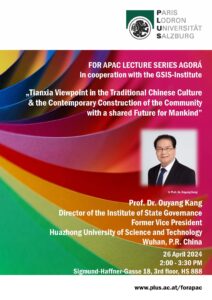 Doctor of Philosophy, National Teaching Master, Dean of the Institute of National Governance at Huazhong University of Science and Technology, Director of the Institute of Philosophy, Second level Professor of the School of Philosophy, Leading Professor of Outstanding Scholars in HUST Doctoral Supervisor, and „Changjiang Special Post Scholar“ of the Ministry of Education, Former Vice President of Huazhong University of Science and Technology, member of the Discipline Evaluation Group of the Academic Degrees Committee of the State Council, judge of the National Social Science Foundation, member of the Social Science Committee of the Ministry of Education, Deputy Director of the Academic Style Construction Committee of the Ministry of Education, decision support consultant of the Hubei Provincial Committee of the Communist Party of China, advisory committee member of the Hubei Provincial People’s Government, and member of the Hubei Provincial Political Consultative Conference.
Doctor of Philosophy, National Teaching Master, Dean of the Institute of National Governance at Huazhong University of Science and Technology, Director of the Institute of Philosophy, Second level Professor of the School of Philosophy, Leading Professor of Outstanding Scholars in HUST Doctoral Supervisor, and „Changjiang Special Post Scholar“ of the Ministry of Education, Former Vice President of Huazhong University of Science and Technology, member of the Discipline Evaluation Group of the Academic Degrees Committee of the State Council, judge of the National Social Science Foundation, member of the Social Science Committee of the Ministry of Education, Deputy Director of the Academic Style Construction Committee of the Ministry of Education, decision support consultant of the Hubei Provincial Committee of the Communist Party of China, advisory committee member of the Hubei Provincial People’s Government, and member of the Hubei Provincial Political Consultative Conference.
He has authored more than 20 works, including „Introduction to Social Epistemology“, and published over 400 academic papers in Chinese and English in „Chinese Social Sciences“ and other journals. He has won more than 20 awards for outstanding achievements in social sciences from the national, Ministry of Education, and Hubei Province. He has led more than 20 national, provincial, and international collaborative research projects, and has gone abroad dozens of times to engage in academic exchanges and collaborative research.
Since 1992, he has been receiving special allowances from the State Council and has been selected as one of the „Cross Century Excellent Talents“ by the Ministry of Education, the „Hundred and Ten Thousand Talents Project“ by the Ministry of Human Resources, the „Teaching Master“ of the National Ten Thousand Talents Plan of the Central Organization Department, and the „Changjiang Special Post Scholar“ by the Ministry of Education. He has been teaching the „Introduction to Philosophy“ video open course in Chinese universities and the „Philosophy, Culture, and Life Wisdom“ national first-class undergraduate course. Currently, he is the chief expert of the National Social Science Fund’s major project „Big Data Driven Modernization of Local Governance“.




